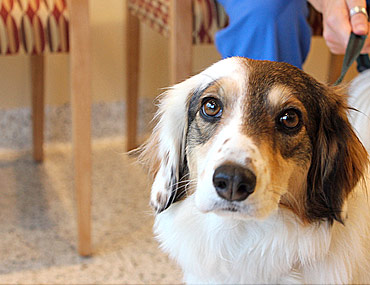Overview
Canine distemper is a very contagious and deadly disease caused by a virus. Dogs and ferrets as well as certain species of wildlife, such as raccoons, wolves, foxes, and skunks, are at risk. Although there is no cure for distemper, the most important fact to remember is that it is preventable through vaccination. For dogs that have developed clinical signs of distemper, the prognosis is very guarded depending on the immune response and severity of symptoms. Dogs that develop neurological signs are the least likely to recover.
While dogs of all ages can become infected with canine distemper virus, puppies—especially those with poor immune systems or those that are unvaccinated or not completely vaccinated—are at the greatest risk for this nasty virus, which is spread through the air or by direct contact. It invades the tonsils and lymph nodes first, and then spreads to the respiratory, urinary, digestive, and nervous systems.
 Symptoms
Symptoms
The symptoms of canine distemper depend on the stage of the virus.
Initial symptoms include:
As the virus progresses and it begins to attack other areas of the body, symptoms can include:
- Seizures
- Paralysis
- Odd behavior
- Aggressiveness
- Tics or tremors
- Retinal discoloration
- Hardening of the pads of the feet
Diagnosis/Treatment
Your veterinarian will perform a thorough physical exam and take a detailed history of your pet, including vaccination status.
Additionally, your veterinarian may recommend the following diagnostic tests:
- Chemistry tests to evaluate kidney, liver, and pancreatic function, as well as sugar levels
- Antibody tests to identify if your pet has been exposed to infectious disease
- A complete blood count (CBC) to rule out blood-related conditions
- Electrolyte tests to ensure your pet isn’t dehydrated or suffering from an electrolyte imbalance
- Urine tests to screen for urinary tract infection and other disease, and to evaluate the ability of the kidneys to concentrate urine
- X-rays of the chest and abdomen
Unfortunately, only supportive care can be offered once a dog becomes infected and develops clinical signs; if symptoms are severe, many dogs are not able to recover. Even those dogs that appear to make a full recovery may develop fatal neurological signs of the disease later in life. Your veterinarian will recommend supportive therapy tailored to your dog’s needs; this may include hospitalization, fluid therapy, antibiotics, and treatment for respiratory, intestinal, or neurological signs.
Prevention
This virus can be prevented through vaccination!
If you have any questions or concerns, you should always visit or call your veterinarian – they are your best resource to ensure the health and well-being of your pets.
